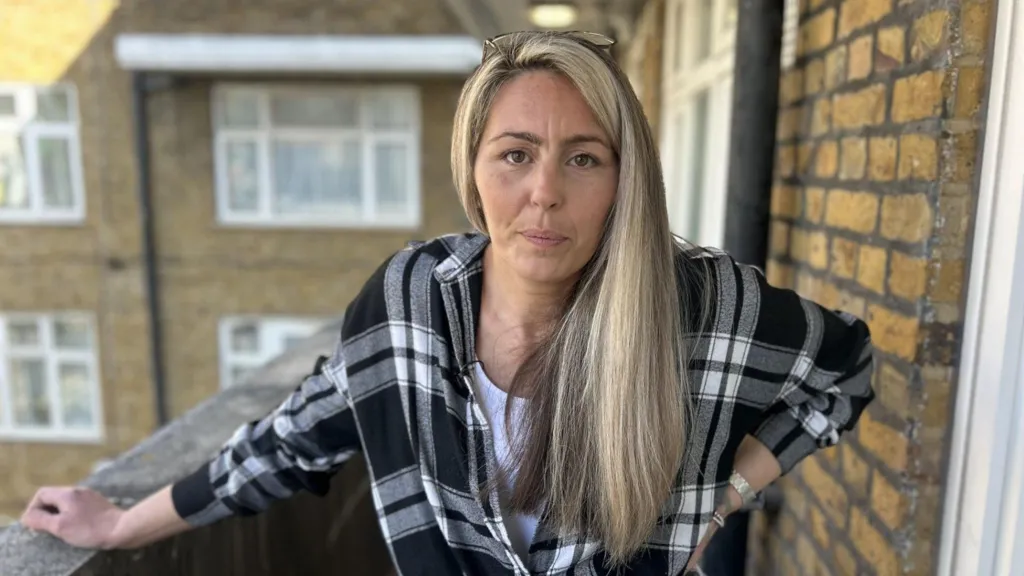
 BBC
BBC"We're treated like peasants. Like we're not good enough to live in decent homes," says Lorraine Branch, a tenant on the Nags Head Estate in east London.
She is part of a group of tenants who have resorted to enlisting lawyers and health workers from the charity Medact, to fight against Peabody after complaining for years of damp and mould in their homes.
The tenants said the Bethnal Green estate has had long-standing problems which they blame for health issue including respiratory illnesses, and claim previous repairs have only been a "quick fix" which have not resolved them.
Peabody, one of England's largest housing associations, said it had "invested over £1m on improvements" in 2024 but "unfortunately, it will take time to resolve all the issues".
Lorraine has been living on the Nags Head Estate for 14 years with her four children.
She said: "We've tried to gather all the tenants, door knocking, handing out leaflets, gatherings just to get people involved.
"We've hired lawyers, we've had medical professionals run by a charity to help us."
Lorraine showed me a wall of one of the flats which was painted last summer.
The wall was clearly still damp and the paint came off on her hand when she touched it.
"They're quick fixes," she said.
"They're not properly insulating the walls. Nothing is getting resolved," she said.
"In the long term you'd think they'd put in the money to fix the problems rather than keep coming back, keep coming back. It's costing more money."
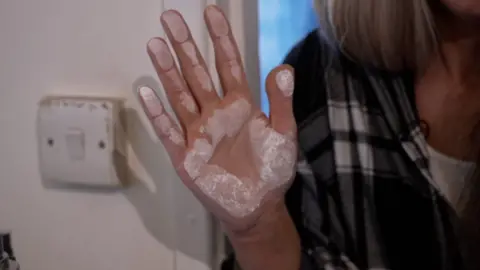
The BBC filmed in another flat with black mould in the hallway, kitchen and on the shower curtains.
The carpet was wet and the flat smelt damp.
The tenant, who did not want to be named, said they had reported the problems to Peabody but claimed it did not act for eight weeks.
After the housing association organised washing the mould off, the problems "quickly returned", they added.
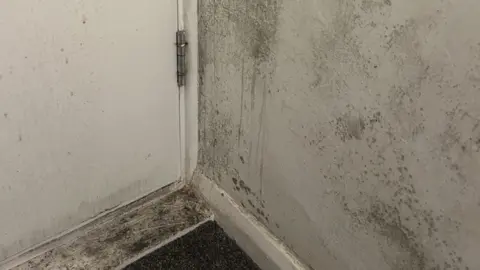
Fatima Tejani has lived on the estate for 16 years with her family and said her respiratory problems started after she moved in.
"I started to have COPD [chronic obstructive pulmonary disease], lung problems," she said.
"I blame the house.
"When you have health problems, you have mental health problems. Peabody has made us sick."
'When I'm out I'm fine, but when I'm inside [the flat] I start to cough. It's not normal for me."
In 2024 her family was moved to temporary housing for three months whilst Peabody conducted repair work.
But when the family returned they found "more difficulties than before", including condensation on the windows and damp carpets.
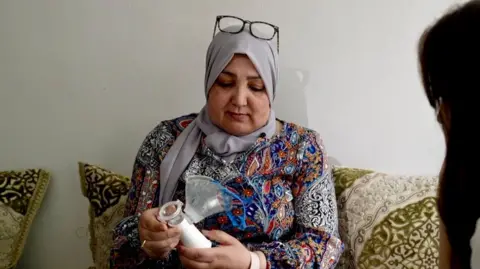
Fatima believes the repairs were cosmetic and said they did not address the root causes of the mould and damp.
"I'm really worried about the combination of water and electricity," she added.
"What's going to happen? If we go to sleep, are we going to wake up?"
The housing association provided them with dehumidifiers but her three children, who share a room, said it makes it difficult to sleep.
Her 10-year-old son said: "I would wake up and my face - it wasn't sweating - but there was water all over my face."
The tenants eventually decided they would begin working with professionals at the health justice campaign charity Medact, to push for a solution.
In a survey it carried out in 2024 of 37 households - about a quarter of the social tenants on the estate - 35 said they had visible mould, and 30 households said they had damp in their properties.
The charity said 31 households reported new symptoms or injuries since moving into their properties, and 19 said at least one member had developed a respiratory condition.
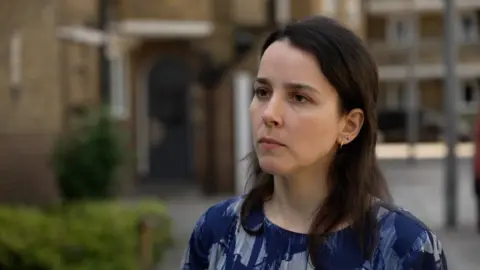
Medact said in its opinion, these were "likely related to the widespread mould and damp on the estate".
Medact's Dr Isobel Braithwaite explained: "We've seen really extensive issues with damp, mould, leaks and disrepair and we've also seen that people are reporting really high rates of health problems, particularly respiratory but also affecting mental health.
"We think those things are linked."
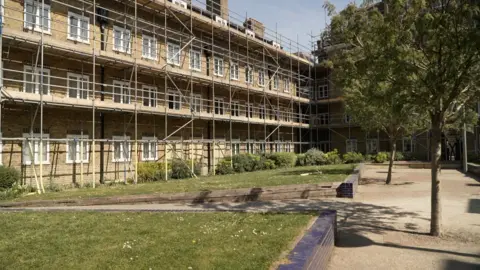
Tracy Packer, Peabody's managing director for north-east London, said it was "an important report" which "reflects survey responses from around a quarter of homes on the estate."
She said Peabody wanted to hear from all Nags Head residents to "help us shape this investment and agree where the improvements will be made".
"Last year we invested over £1m on improvements here and I'm committed to designing a £3m plan with residents which I hope will make a positive difference.
"Unfortunately, it will take time to resolve all the issues."
She added wider issues, such as overcrowding, "continue to be a huge problem and is a major part of London's housing emergency", along with "rapidly rising costs" which means its social rented homes "cost far more to run, than the rent can cover".
"This makes it an exceptionally challenging situation," she said.
"But we are doing our best and are determined to improve."
It comes as landlords for social housing in England will have to fix damp and mouldy properties more quickly from October, the government has announced.
The rules will eventually cover private landlords as well.
Campaigners called for stricter rules after two-year-old Awaab Ishak died because of mould at his Rochdale home in 2020.
Listen to the best of BBC Radio London on Sounds and follow BBC London on Facebook, X and Instagram. Send your story ideas to hello.bbclondon@bbc.co.uk